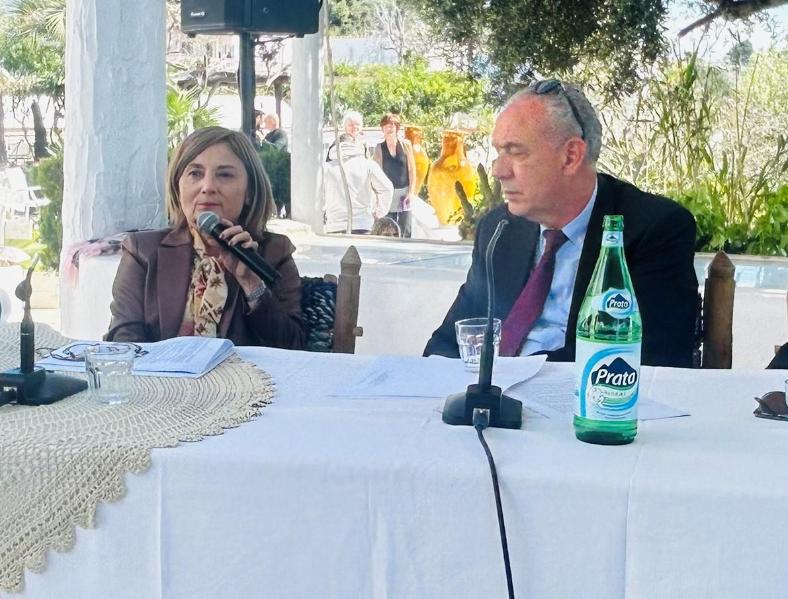
EIB report presented at the initiative of EIB Vice-President Vigliotti and Extraordinary Commissioner Legnini
How will the climate on the island of Ischia change between now and 2050 and how can the planning of post-disaster operations be adapted in order to contain risks and vulnerabilities caused by environmental challenges? The answers are contained in an innovative study that the European Investment Bank (EIB) has prepared free of charge, and made available to the Commissioner’s Office and the entire Ischia community under a cooperation agreement signed on 21 April 2024.
This is the first time that a study on climate change has been carried out with the aim of steering the planning of post-disaster reconstruction and safety efforts towards sustainability and resilience. And Ischia is the pioneer. The extensive ‘Report on the analysis of climate risks and vulnerabilities on the island of Ischia’ was presented today under an initiative promoted by EIB Vice-President Gelsomina Vigliotti and the Extraordinary Commissioner for post-earthquake reconstruction and Delegated Commissioner for the landslide emergency in Ischia, Giovanni Legnini, at an event held in the Giardini Ravino botanical gardens in Forio. The event was attended by, among others, representatives of the Campania Region, the Metropolitan City of Naples, the District Basin Authority of the Southern Apennines, as well as the mayors of the island of Ischia, citizens committees and the press. Minister of the Environment and Energy Security Gilberto Pichetto Fratin MP also delivered his own message by video connection.
As a result of intensive field analysis and having consulted a wide range of data, information and scientific studies provided by other bodies, the EIB report provides a clear view of the environmental challenges and future climate risks, proposing innovative and resilient solutions to tackle these. The study therefore represents a vital tool for the reconstruction and improved safety of the island of Ischia, enabling the stakeholders to evaluate and adopt preventive and adaptation measures aimed at addressing climate challenges in an effective and proactive manner.
Structured in two parts, the EIB report’s first section is dedicated to an analysis of the risks and vulnerabilities arising from climate change between now and 2050, and to the impact on the island’s key infrastructure and economic sectors. The second part of the report focuses on economic and financial assessments including a cost-benefit analysis and guidance on strengthening project management on the island of Ischia.
The report highlights an expected increase in extreme weather events in the coming decades, such as heavy rainfall and rising sea levels. In this regard, the report provides a series of useful recommendations, to be implemented in the short, medium and long term, aimed at improving resilience and containing and mitigating the potential risks caused by natural phenomena: from the adoption of protection measures and monitoring and alert systems to the sustainable management of water resources. Such measures are broadly in line with the activities already identified and initiated by the local authorities and the Commissioner’s Office to improve safety on the island, and can also be adopted for future works yet to be developed.
“The EIB is the European Union’s climate bank and has always been a close partner of Italy. With this innovative report and thanks to its fruitful collaboration with the Commissioner’s Office, the EIB once again confirms its commitment to promoting sustainable and efficient reconstruction, designed to make the island and its infrastructure more resilient against future extreme weather events. In addition to providing financing on favourable terms, the EIB offers technical advisory services free of charge to public authorities in order to support the implementation of projects and facilitate access to investment”, said EIB Vice-President Gelsomina Vigliotti.
“I wish to thank the EIB and Vice-President Vigliotti for this important contribution to the complex and delicate reconstruction process on the island of Ischia. Our goal is to combine the island’s safety with public and private reconstruction, aimed at fostering sustainability and resilience. The report presented today makes a valuable contribution to achieving these goals”, said the Extraordinary Commissioner for post-earthquake reconstruction and Delegated Commissioner for the landslide emergency in Ischia, Giovanni Legnini.
Background information
EIB
The European Investment Bank (EIB) is the long-term lending institution of the European Union owned by its Member States. It finances sound investments that can contribute to EU policy. EIB projects strengthen competitiveness, foster innovation, promote sustainable development and improve social and territorial cohesion while supporting a fair and rapid transition towards climate neutrality.
The EIB Group, which also includes the European Investment Fund (EIF), signed a total of €88 billion in new financing for more than 900 projects in 2023. Thanks to these commitments, around €320 billion of investment is expected to be unlocked supporting 400 000 businesses and 5.4 million jobs.
All projects financed by the EIB Group are in line with the Paris Agreement. The EIB Group does not finance fossil fuel-related investments and is on track to deliver on its commitment under the Climate Bank Roadmap to support €1 trillion in climate and environmental sustainability investment in the decade to 2030. More than half of the EIB Group’s annual financing supports projects that contribute directly to climate change mitigation and adaptation and environmental health.
Around half of EIB financing within the European Union is allocated to cohesion regions, namely those where per capita income is lower, demonstrating the Bank’s commitment to promoting inclusive growth and convergence of living standards.